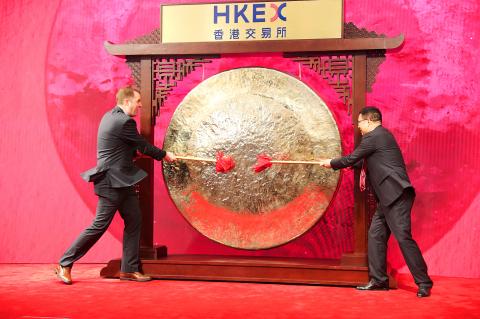The Asia-Pacific beer unit of Anheuser-Busch InBev NV gained as much as 7 percent in its Hong Kong trading debut, boosting the lackluster global market in initial public offerings (IPO) and vindicating the beermaker in its second attempt at an Asian listing.
Budweiser Brewing Co APAC Ltd raised US$5 billion selling shares at the bottom of a price range last week in the world’s second-biggest IPO this year behind Uber Technologies Inc. That gave the Asian unit an enterprise value of US$45 billion, helping the parent company reduce its massive debt load and laying the groundwork for possible acquisitions.
The shares rose to as high as HK$28.90 in Hong Kong trading yesterday from the offering price of HK$27. The benchmark Hang Seng Index increased 0.6 percent. Shares of the parent company slipped 0.4 percent in early Brussels trading, but they have risen 50 percent so far this year.

Photo: Bloomberg
“We’ve seen very solid demand for our stock when we did the management roadshow,” Budweiser Brewing APAC chief executive officer Jan Craps told a briefing in Hong Kong yesterday. “We are confident there’s a strong foundation here.”
The result provides an encouraging conclusion to what has been a rocky IPO path for the Asia arm of the world’s biggest beer company. Budweiser Brewing originally expected to storm into Hong Kong as a US$64 billion company, but the deal was shelved in July amid lackluster demand. It was a high-profile setback that spotlighted the growing disconnect between companies’ lofty private valuations and investors’ expectations, with would-be buyers skeptical of even well-known brands.
Anheuser-Busch InBev revived the offering after selling its Australian operations to Japan’s Asahi Group Holdings Ltd for about US$11 billion. That roughly halved the size of the Asia-Pacific offering, giving investors a more focused stake in faster-growing parts of the regional business, with brands like Cass in South Korea and Harbin in China.
The gains in Budweiser’s trading debut might give some hope to a global IPO scene unsettled this year by volatile markets and geopolitical uncertainties. Multiple companies have halted their scheduled listings in Hong Kong, which is facing twin pressures from anti-government protests and a trade dispute between the US and China.
Budweiser’s launch helped propel Hong Kong past Shanghai as the world’s No. 3 market for IPOs this year. It might also shore up investor sentiment for upcoming IPOs that might include the lucrative secondary listing of Alibaba Group Holding Ltd (阿里巴巴).
“This IPO is quite different to many others that have faced headwinds recently,” Sanford C. Bernstein analyst Euan McLeish said. “BUD APAC is widely recognized as a high-quality company.”
“Strong earnings visibility” will drive continued investor interest, McLeish said.
The debut helped Anheuser-Busch InBev further trim its US$100 billion-plus debt pile after its purchase of SABMiller in 2016, letting it accelerate its goal of creating a regional champion in Asia, especially through acquisitions.
Craps yesterday said that the company can create a lot of value with regional players in Vietnam, Thailand and Cambodia.

With an approval rating of just two percent, Peruvian President Dina Boluarte might be the world’s most unpopular leader, according to pollsters. Protests greeted her rise to power 29 months ago, and have marked her entire term — joined by assorted scandals, investigations, controversies and a surge in gang violence. The 63-year-old is the target of a dozen probes, including for her alleged failure to declare gifts of luxury jewels and watches, a scandal inevitably dubbed “Rolexgate.” She is also under the microscope for a two-week undeclared absence for nose surgery — which she insists was medical, not cosmetic — and is

GROWING CONCERN: Some senior Trump administration officials opposed the UAE expansion over fears that another TSMC project could jeopardize its US investment Taiwan Semiconductor Manufacturing Co (TSMC, 台積電) is evaluating building an advanced production facility in the United Arab Emirates (UAE) and has discussed the possibility with officials in US President Donald Trump’s administration, people familiar with the matter said, in a potentially major bet on the Middle East that would only come to fruition with Washington’s approval. The company has had multiple meetings in the past few months with US Special Envoy to the Middle East Steve Witkoff and officials from MGX, an influential investment vehicle overseen by the UAE president’s brother, the people said. The conversations are a continuation of talks that

CAUTIOUS RECOVERY: While the manufacturing sector returned to growth amid the US-China trade truce, firms remain wary as uncertainty clouds the outlook, the CIER said The local manufacturing sector returned to expansion last month, as the official purchasing managers’ index (PMI) rose 2.1 points to 51.0, driven by a temporary easing in US-China trade tensions, the Chung-Hua Institution for Economic Research (CIER, 中華經濟研究院) said yesterday. The PMI gauges the health of the manufacturing industry, with readings above 50 indicating expansion and those below 50 signaling contraction. “Firms are not as pessimistic as they were in April, but they remain far from optimistic,” CIER president Lien Hsien-ming (連賢明) said at a news conference. The full impact of US tariff decisions is unlikely to become clear until later this month

Nintendo Co hopes to match the runaway success of the Switch when its leveled-up new console hits shelves on Thursday, with strong early sales expected despite the gadget’s high price. Featuring a bigger screen and more processing power, the Switch 2 is an upgrade to its predecessor, which has sold 152 million units since launching in 2017 — making it the third-best-selling video game console of all time. However, despite buzz among fans and robust demand for pre-orders, headwinds for Nintendo include uncertainty over US trade tariffs and whether enough people are willing to shell out. The Switch 2 “is priced relatively high”